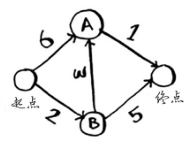2019你好!好好生活,好好工作!
狄克斯特拉算法
狄克斯特拉算法(Dijkstra )用于计算出不存在非负权重的情况下,起点到各个节点的最短距离
可用于解决2类问题:
从A出发是否存在到达B的路径;
从A出发到达B的最短路径(时间最少、或者路径最少等),事实上最后计算完成后,已经得到了A到各个节点的最短路径了;
其思路为:
(1) 找出“最便宜”的节点,即可在最短时间内到达的节点。
(2) 更新该节点对应的邻居节点的开销,其含义将稍后介绍。
(3) 重复这个过程,直到对图中的每个节点都这样做了。
(4) 计算最终路径。
我们根据书中的例子给出相关的具体实现

因为个人最经常使用的是OC语言,所以先用OC简单实现了一下,有不对之处还请告知,谢谢!

- (void)installDijkstra { //用来记录已经被便利过该节点所有邻居的节点 NSMutableArray *processed= [NSMutableArray array]; //描述图的 NSMutableDictionary *origianldic = [NSMutableDictionary dictionary]; [origianldic setObject:@{@"a":@6,@"b":@2} forKey:@"start"]; [origianldic setObject:@{@"fin":@1} forKey:@"a"]; [origianldic setObject:@{@"a":@3,@"fin":@5} forKey:@"b"]; //创建开销 NSMutableDictionary *costDic = [NSMutableDictionary dictionary]; costDic[@"a"] = @6; costDic[@"b"] = @2; costDic[@"fin"] = @(NSIntegerMax); //记录该节点的父节点的 NSMutableDictionary *parentDic = [NSMutableDictionary dictionary]; parentDic[@"a"] = @"start"; parentDic[@"b"] = @"start"; parentDic[@"fin"] = @""; NSString *node = [self findLowerCostNode:costDic array:processed]; while (![node isEqualToString:@""]) { NSDictionary *tempDic = origianldic[node]; for (NSString *key in tempDic.allKeys) { NSInteger newCount = [costDic[node]integerValue] + [tempDic[key]integerValue]; if ([costDic[key] integerValue] > newCount) { costDic[key] = @(newCount); parentDic[key] = node; } } [processed addObject:node]; node = [self findLowerCostNode:costDic array:processed]; } NSLog(@"origianldic = %@,\ncostDic = %@,\nparentDic = %@,\n processed = %@,\n NSIntegerMax = %ld",origianldic,costDic,parentDic,processed,NSIntegerMax); NSLog(@"--end --costDic = %@",costDic); NSLog(@"--end --parentDic = %@",parentDic); } /** 找到开销最小的节点 @param dic dic @param processArray 记录节点 @return 为空说明已经查找完毕 */ - (NSString *)findLowerCostNode:(NSDictionary *)dic array:(NSMutableArray *)processArray { NSInteger lowerCost = [dic[@"fin"]integerValue]; NSString *lowedNode = @""; for (NSString *key in dic.allKeys) { NSInteger costNum = [dic[key]integerValue]; if (costNum < lowerCost && (![processArray containsObject:key]) ) { lowerCost = costNum; lowedNode = key; } } return lowedNode; }
2019-01-13 21:24:14.382432+0800 HaiFeiTestProject[29763:1130947] --end --costDic = { a = 5; b = 2; fin = 6; }
python实现

infinity = float('inf') graph = {'start': {'a': 6, 'b': 2}, 'a': {'fin': 1}, 'b': {'a': 3, 'fin': 5}, 'fin': {}} costs = {'a': 6, 'b': 2, 'fin': infinity} parents = {'a': 'start', 'b': 'start', 'fin': None} processed = [] def main(graph, costs, parents, processed, infinity): node = find_lowest_cost_node(costs, processed) while node is not None: for n in graph[node].keys(): new_cost = costs[node] + graph[node][n] if costs[n] > new_cost: costs[n] = new_cost parents[n] = node processed.append(node) node = find_lowest_cost_node(costs, processed) def find_lowest_cost_node(costs, processed): lowest_cost = float('inf') lowest_cost_node = None for node in costs: if lowest_cost > costs[node] and node not in processed: lowest_cost = costs[node] lowest_cost_node = node return lowest_cost_node main(graph, costs, parents, processed, infinity) print(costs) print(parents)
运行结果

算法图解之狄克斯特拉算法 和书中描述基本一致,可参考!
